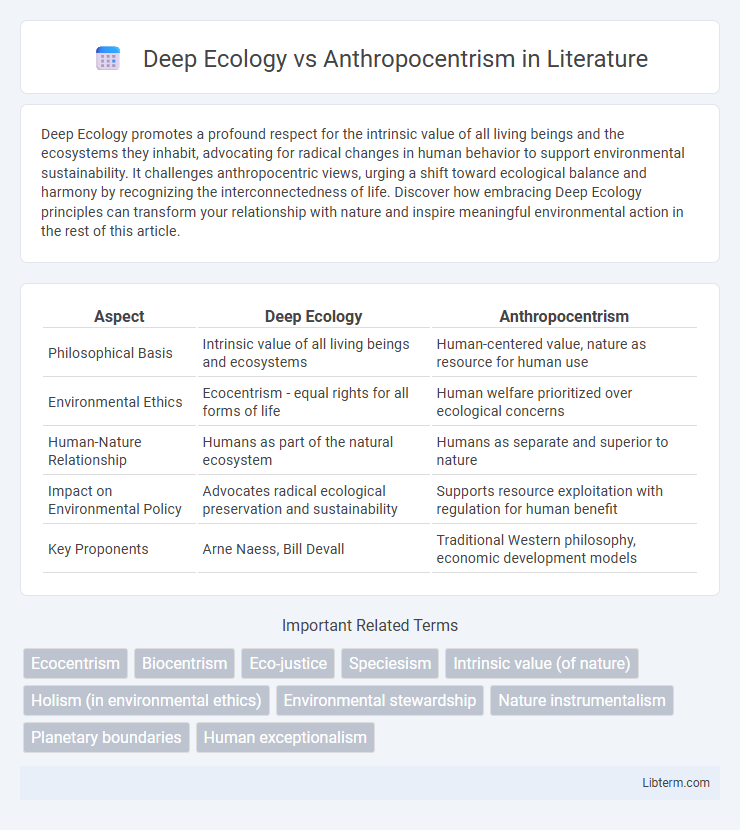Deep Ecology promotes a profound respect for the intrinsic value of all living beings and the ecosystems they inhabit, advocating for radical changes in human behavior to support environmental sustainability. It challenges anthropocentric views, urging a shift toward ecological balance and harmony by recognizing the interconnectedness of life. Discover how embracing Deep Ecology principles can transform your relationship with nature and inspire meaningful environmental action in the rest of this article.
Table of Comparison
| Aspect | Deep Ecology | Anthropocentrism |
|---|---|---|
| Philosophical Basis | Intrinsic value of all living beings and ecosystems | Human-centered value, nature as resource for human use |
| Environmental Ethics | Ecocentrism - equal rights for all forms of life | Human welfare prioritized over ecological concerns |
| Human-Nature Relationship | Humans as part of the natural ecosystem | Humans as separate and superior to nature |
| Impact on Environmental Policy | Advocates radical ecological preservation and sustainability | Supports resource exploitation with regulation for human benefit |
| Key Proponents | Arne Naess, Bill Devall | Traditional Western philosophy, economic development models |
Introduction: Understanding Deep Ecology and Anthropocentrism
Deep Ecology emphasizes the intrinsic value of all living beings and ecological systems, advocating for a profound shift in human-environment relationships beyond utility-based perspectives. Anthropocentrism prioritizes human needs and interests, often treating nature as a resource for exploitation and human benefit. Understanding these contrasting worldviews clarifies the ethical foundations shaping environmental policies and conservation efforts.
Historical Origins of Environmental Philosophies
Deep Ecology emerged in the 1970s as a radical shift from traditional anthropocentrism, emphasizing intrinsic value in all living beings rather than human-centered concerns. Anthropocentrism, rooted in Western philosophical traditions since ancient Greece, prioritizes human needs and interests above the environment. Historical environmental philosophies reflect evolving attitudes, from conservation ethics in the early 20th century to the biocentric principles foundational to Deep Ecology.
Core Principles of Deep Ecology
Deep Ecology emphasizes the intrinsic value of all living beings, advocating for biocentric equality where humans are considered equal members of Earth's ecosystems rather than dominant rulers. Core principles include the recognition of the interdependence of all life forms, the necessity for substantial reductions in human population and consumption to maintain ecological balance, and the promotion of policies that prioritize ecological sustainability over economic growth. This philosophy challenges Anthropocentrism by opposing human-centered approaches that prioritize human needs and interests above the health and integrity of the natural environment.
Key Tenets of Anthropocentrism
Anthropocentrism centers on human beings as the most significant entities in the universe, asserting that nature primarily serves human needs and interests. This viewpoint prioritizes economic growth, technological advancement, and resource exploitation for human benefit, often disregarding ecological balance. It contrasts with Deep Ecology by emphasizing human exceptionalism and advocating environmental policies that ensure the continuation of human prosperity.
Human-Nature Relationships: Contrasting Perspectives
Deep ecology emphasizes the intrinsic value of all living beings, advocating for a profound respect and ethical responsibility toward nature independent of human utility. Anthropocentrism centers human needs and interests, often prioritizing environmental management based on benefits to humanity rather than ecological balance. These contrasting perspectives highlight a fundamental debate about whether humans are part of an interconnected ecosystem or dominant stewards entitled to exploit natural resources.
Ethical Implications for Environmental Policy
Deep Ecology advocates for the intrinsic value of all living beings, urging environmental policies that prioritize biodiversity and ecosystem health over human-centered interests. Anthropocentrism places human needs and economic growth at the forefront, often leading to policies that exploit natural resources and neglect long-term ecological consequences. Ethical implications of adopting deep ecology in environmental policy include fostering sustainability, promoting animal rights, and addressing climate change with a holistic, non-human-centric perspective.
Critiques and Challenges of Deep Ecology
Deep Ecology faces critiques for its perceived radical environmentalism that may undervalue human needs and social justice, potentially leading to eco-centric policies that overlook economic and cultural complexities. Critics argue its holistic nature can impose ethical frameworks that conflict with anthropocentric human rights and development goals. Practical challenges include implementing deep ecology principles within mainstream political and economic systems resistant to reducing human-centered resource exploitation.
Anthropocentrism in Modern Society
Anthropocentrism in modern society prioritizes human interests and values, often leading to environmental exploitation and unsustainable resource use. This worldview places humans at the center of ethical consideration, marginalizing ecological systems and non-human species. The dominance of anthropocentric policies contributes to climate change, biodiversity loss, and environmental degradation, highlighting the urgent need for more ecocentric approaches.
Impact on Conservation and Sustainability Initiatives
Deep Ecology promotes intrinsic value of all living beings, fostering biodiversity preservation and ecosystem integrity as central to conservation efforts. Anthropocentrism prioritizes human needs, often leading to resource exploitation and short-term sustainability measures that may undermine long-term ecological balance. Conservation initiatives grounded in Deep Ecology emphasize holistic ecosystem health, while anthropocentric approaches typically favor economic growth and human welfare in sustainability planning.
The Future of Environmental Ethics: Toward Integration
Deep ecology advocates for intrinsic value in all living beings, promoting a biocentric approach that challenges anthropocentric views centered on human interests. The future of environmental ethics moves toward integrating deep ecology's holistic respect for nature with pragmatic frameworks that address human well-being and ecological sustainability. This integration aims to develop ethical models that foster coexistence, recognizing interconnected ecosystems and human responsibilities within them.
Deep Ecology Infographic

 libterm.com
libterm.com